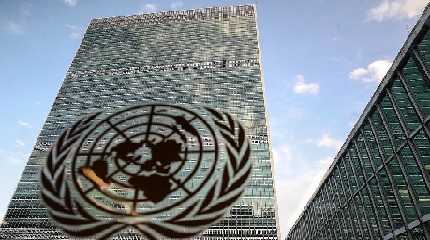
UNITED NATIONS, April 7 (Xinhua) -- The UN General Assembly adopted a resolution on Thursday that allows the assembly to suspend the Russian Federation's membership in the Geneva-based UN Human Rights Council.
The draft resolution, "Suspension of the rights of membership of the Russian Federation in the Human Rights Council," obtained 93 "yes" votes and 24 "no" votes from the 193-member General Assembly. A total of 58 countries abstained. Eighteen countries did not participate in the voting.
China voted against the move pushed by the United States.
A two-thirds majority of voting members - abstentions do not count - can suspend a country from the 47-member council. Libya was suspended in 2011 because of violence against protesters by forces loyal to then-leader Muammar Gaddafi.
The resolution expresses "grave concern at the ongoing human rights and humanitarian crisis in Ukraine," particularly at reports of rights abuses by Russia.
As a member of the Geneva-based council, Russia was in its second year of a three-year term.
The General Assembly has adopted another two resolutions related to Russia's "special military operation" in Ukraine since it began on Feb. 24.
After Ukraine accused Russian troops of "killing hundreds of civilians" across the streets of the Kiev suburb of Bucha, the United States announced it would seek Russia's suspension. Russia has denied attacking civilians in Ukraine.
Speaking of the draft, Zhang Jun, China's permanent representative to the United Nations, told the assembly before the voting that the draft resolution was not drafted "in an open and transparent manner," nor did it follow the tradition of holding consultations within the whole membership to heed the broadest opinions.
"Under such circumstances, such a hasty move at the General Assembly, which forces countries to choose sides, will aggravate the division among member states and intensify the contradictions between the parties concerned. It is like adding fuel to the fire, which is not conducive to the de-escalation of conflicts, and even less so to advancing the peace talks," he said.
Zhang pointed out that dealing with the membership of the Human Rights Council in such a way "would set a new and dangerous precedent," further intensify the confrontations in the field of human rights, bring a greater impact on the UN governance system, and produce serious consequences.
"Therefore, China will have to vote against this draft resolution," he stressed.
"China calls on all parties to work together in the same direction, so as to create opportunities for peace and prospects for negotiation. China will continue to hold an objective and impartial position and play its responsible and constructive role in this regard," he said.
Sergiy Kyslytsya, Ukraine's UN ambassador, urged countries to support the resolution before the vote.
After the vote, Russia's deputy permanent representative to the UN, Gennady Kuzmin, called the General Assembly's decision "an illegitimate and politically motivated" step that is clearly intended to punish a sovereign member state of the UN, even going as far as calling it "open blackmail of sovereign states."
In addition, he claimed that the council is monopolized by one group of states that use it for short-term interests, and that "such actions violate the mandate entrusted by the international community on the Human Rights Council and overall undermine trust in this body."
After the vote was completed, Kuzmin said Russia had already made the decision to end its membership with the Human Rights Council earlier in the day.




